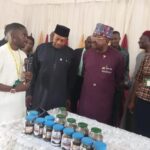By Oluwafunke Ishola
The Federal Government has partnered the private sector to bridge the 29 million dollars procurement funding gap for family planning commodities to reduce maternal mortality.
The Coordinating Minister of Health and Social Welfare, Prof. Ali Pate, said this during a High Level Private Sector Forum on Family Planning on Wednesday in Lagos.
Pate noted that the cost of procurement for family planning products increased from 26.6 million dollars in 2019 to 41.8 million dollars in 2023.
He said that over the same period, procurement funding gap increased from $5.7million to $29 million, making it impossible to achieve full supply of family planning commodities to health facilities.
According to him, the just concluded 64th National Council on Health Meeting approved the request for establishment and funding of Budget Lines for Family Planning at both National and Sub-National levels for the implementation of Nigeria’s Family Planning programme.
He, however, noted that while this was a positive step, effectively addressing the funding and other challenges facing Nigeria’s family planning programme goes beyond the public sector.
“A broad-based stakeholder engagement process involving the public, social marketing as well as the private sectors is required.
“It is important to note that a National Guideline on Private Engagement for Family Planning has already been developed and will be a useful tool in driving this process,” he said.
Pate noted that the forum aims to secure commitment for family planning by private sectors, present family planning investment cases for feedback and discuss plans towards actualising Family Planning target of 2030.
The minister urged that subsequent engagements and efforts be made for a workable roadmap for joint and inclusive implementation towards realising a 27 per cent modern method contraceptive prevalence rate target by 2030.
Pate, represented by Dr Stella Nwosu, Director, Family Planning at the ministry, also called for strategies around innovative financing and technology-driven family planning programmes in the country.
“Actualising local production of family planning commodities in Nigeria should also be on the agenda with international manufacturers being encouraged to go into partnership with Nigerian companies.
“We should also not forget to come up with list of “asks” for government to address towards creating the enabling environment for our ideas to thrive,” he said.
Similarly, the Special Adviser to the President on Health, Dr Salma Anas, said the funding gap caused a myriad of challenges to family planning service provision.
Anas explained that it caused attendant impact on other health indices including maternal deaths and support for the actualisation of the reproductive health rights of women.
She said the country was at the critical stage in its potential to reap dividends from its demographic transition.
Anas said available data had shown reductions in overall mortality leading to improvements in life expectancy, with an already bulging youth population.
“Our chance at enabling the country to reap the dividends of this demography lies in our ability to follow this transition with a lower fertility rate, which would enable a greater per capita investment in health, education and other aspects of human development and could lead to huge economic returns for the country,” she said.
Also, Mr Koessan Kuawu, the Deputy Representative, United Nations Population Fund (UNFPA) Nigeria, said family planning would save the lives of thousands of women and girls in communities.
Kuawu said family planning would reduce the number of unintended pregnancies, space pregnancies, empower women to make informed decisions about their reproductive health, and improve access to quality healthcare.
He said the UNFPA would continue to work with the government to develop and implement high-impact interventions to accelerate ending of preventable maternal deaths, unmet need for family planning and gender based violence and harmful practices.
Similarly, Dr Owens Wiwa, the Country Director, Clinton Health Access Initiative, said foreign donors provide 88 per cent funding for family planning, stressing the need for domestic funding to cushion the government’s shortfall.
Also, Dr Ejike Oji, the Chairman, Association of the Advancement of the Family Planning, said Nigeria has a population crisis, stressing the use of fertility for population control. (NAN)(www.nannews.ng)
============
Edited by Chinyere Joel-Nwokeoma












